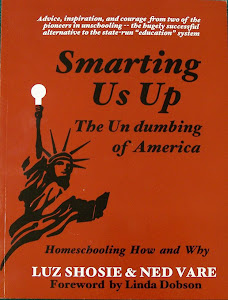"The authority of those who teach is often an obstacle to those who want to learn." - Cicero
As a former teacher, author of a book on learning and father of several children, I have long believed that most children are bright, gifted, and talented in their own ways. However, the more I learn about the public schools, the more I realize that they are set up to seek out and label children's weaknesses or, as they like to call them, "disabilities," but not to identify or develop children's talents or gifts.
What's going on? The schools are not what they claim to be. The above tells us that the schools are not looking for "Excellence," as they say, but are actively working to prevent children from reaching their highest potential, seeking mass mediocrity instead.
One of the school system's first official priorities (after babysitting) is to sort and label our children for government purposes. Here, the schools work in ways that are opposed to what parents want them to do. Schools make extra money (lots of it) by diagnosing "disabilities." The schools have what they call, "the bounty system" to get thousands per "diagnosis," from the state, even though the diagnoses are often made on flimsy grounds. Corrupt? You bet.
Strangely, there is no incentive for identifying a child's strengths or gifts or talents. Therefore, schools no longer look for those strengths. In fact, if a child is able to read well in first or second grade, s/he is sometimes penalized. I've even heard from a parent who was told by a teacher that for her to teach her child to read at age four or five was "child abuse." How insane can it get!
On examining my own habits, I notice that I have several "disorders." While school was about sitting still, I was about moving and doing things, so my school could have labeled me ADD if that diagnosis had existed back then. I do not remember names well, so am I brain defective? I do not keep a checkbook straight, so am I "sequence challenged?" I tend to begin in the middle of projects and work toward both ends, etc. If I were in public school today, my diagnosis might be, "Learning Disabilities." That would make a bundle for the school, but I believe it would damage me.
Today, we know that there are different kinds of intelligence and multiple ways of learning. Following our strengths leads us to work we enjoy and lives that are fulfilling, while we avoid doing things we are not good at and don't enjoy. For example: I was (among other occupations) a competent and happy farmer, but no amount of training would turn me into an accountant.
But the one-size-fits-all school system wants to turn out uniform and predictable people instead of diverse individuals. It does so by claiming that differences from the norms (even artificial ones) are "disabilities." By today's perverse rules, Edison, Einstein, Churchill, Warren Buffet and a host of other successful creative people would be part of the Special Ed food chain, dying on the vines of boredom and neglect, never to be heard from. As Mark Twain wrote, "Public school does not want the cream to rise." If you have bright children, be warned.
Public school's politically correct motto seems to be: "No winners, no losers; all are part of the mediocre middle." Not only does the government want a middle mass, but those who diagnose children are trained to seek disabilities, but are not trained to find kids' gifts and/or talents. The schools have phased out programs for gifted children and are instead concentrating on, and promoting, their alphabet soup of "disorders."
Is there any good news? Yes. While the schools ignore children's strengths, there is Great Potential, Inc (www.giftedbooks.com/), a publishing company that can help parents find their children's strengths. Their latest offering is about the misdiagnoses that their authors claim happen far too often. Great Potential says, "As a result of misdiagnoses, we are unnecessarily medicating many of our best and brightest youth with drugs like Ritalin, Prozac, Lithium, and Paxil, and counseling them inappropriately. Such treatments may diminish their intellectual potential."
Ned Vare is an architectural designer and author; former private school teacher, businessman, and elected official.
Subscribe to:
Post Comments (Atom)


3 comments:
As always Ned,you are on! Look forward to reading your book.
"Schools make extra money (lots of it) by diagnosing "disabilities." The schools have what they call, "the bounty system" to get thousands per "diagnosis," from the state, even though the diagnoses are often made on flimsy grounds. Corrupt? You bet."
Technically yes we do get extra money , but generally those students cost us (and by extension the other students)
-in terms of TA staffing etc- more money than they add to the budget . Also it is not like increases to the school budget go into teachers' pockets- they must be spent on curricular costs in the school. I should mention that this is the case where I am- Canada, and that I'm a school administrator by profession who homeschools his children and has at least one with special needs. (um, this is written by my husband on my blogger account!)
Answering mamazee:
"Technically, yes, we do get extra money." I rest my case.
Also, you say, "those students cost us." Sorry, the schools do not pay the cost of anything, the taxpayers do.
In CT, teachers' pay accounts for about two thirds of school budgets. Therefore budget increases go directly into teachers' pockets.
Post a Comment